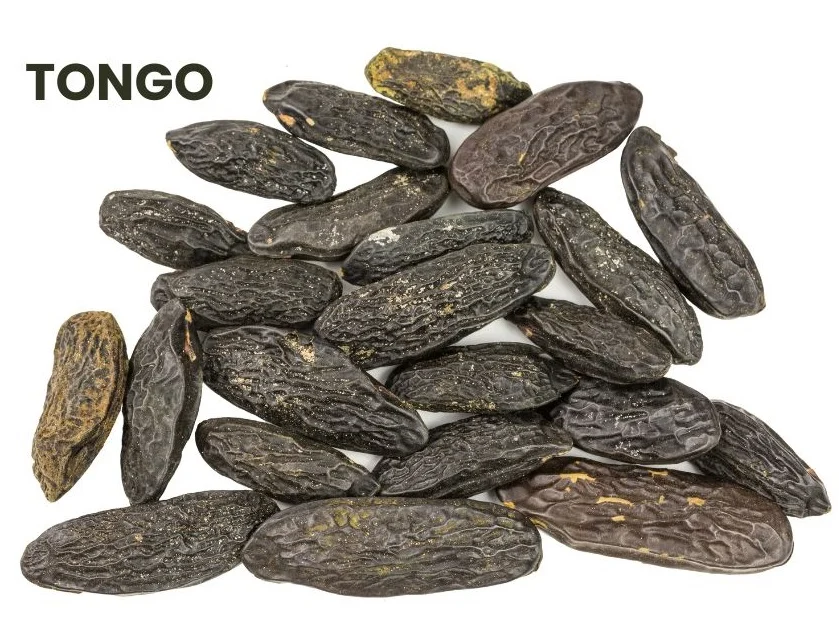Tongo, or Dipteryx odorata, also known as Tonka bean, comes from the seeds of the Coumarouna tree found in Guiana and parts of South America.
It has a long history of medicinal use in both homeopathy and traditional remedies, particularly for its role in treating neuralgic pain and respiratory ailments like whooping cough (pertussis).
The key active ingredient in Tongo is coumarin, which is also found in plants like Melilotus and Anthoxanthum.

SOURCE INFORMATION
Scientific Classification
- Kingdom: Plantae
- Order: Fabales
- Family: Fabaceae
- Genus: Dipteryx
- Species: Dipteryx odorata
Origin and Historical Facts
- Tongo seeds, also known as Tonka beans, have been used historically as a spice, perfume, and medicinal remedy.
- In traditional medicine, the seeds have been employed for their antispasmodic and anticoagulant properties.
- Homeopathically, Tongo is recognized for treating neuralgia, headaches, and pertussis (whooping cough).
DRUG PATHOGENESIS
- Tongo has a specific affinity for the nervous and respiratory systems.
- It is useful in cases of neuralgia, particularly supra-orbital neuralgia, and also for alleviating symptoms of respiratory diseases like whooping cough.
- It also addresses issues related to coryza (inflammation of the mucous membranes in the nose) and related headaches.
PHYSICAL CONSTITUTION, DIATHESIS, AND TEMPERAMENTS
- Physical Constitution: Best suited for individuals suffering from nerve pain (neuralgia), respiratory discomfort, and headaches.
- Diathesis: Suitable for people prone to neuralgic attacks and respiratory infections, particularly those with seasonal allergies or hay fever.
- Temperament: More effective for individuals who experience nervous agitation, restlessness, and irritability due to their ailments.
KEY CHARACTERISTICS
- Neuralgic pain, particularly supra-orbital pain (above the eye).
- Respiratory issues, such as blocked nasal passages, leading to mouth breathing and discomfort.
- Tearing pain in the extremities, especially the hip and leg.
- Sensation of confusion and intoxication, with heaviness in the occiput (back of the head).
DETAILED ORGAN SYMPTOMS
HEAD
- Tearing pain in the supra-orbital nerve, often accompanied by heat and throbbing sensations in the head.
- Epiphora (excessive tearing) and difficulty with vision due to eye strain.
- Mental confusion, especially in the occipital region (back of the head), with drowsiness and a sensation similar to intoxication.
EYES
- Trembling in the upper right eyelid.
- Sensitivity and strain due to neuralgic pain.
NOSE
- Coryza, causing nasal congestion and forcing the patient to breathe through the mouth.
EXTREMITIES
- Tearing pain in the hip joints, femur, and knees, especially on the left side.
- Symptoms worsen during periods of rest or inactivity.
MODALITIES
- Worse: At rest, particularly after long periods of inactivity. Neuralgic symptoms worsen with cold or damp weather.
- Better: Movement tends to improve symptoms, and warmth provides relief from joint pain.
WHAT ARE MODALITIES IN HOMOEOPATHY?
RELATIONSHIP WITH OTHER DRUGS
Compare with
- Melilotus (also contains coumarin, used for treating neuralgia and hay fever).
- Anthoxanthum and Asperula (other coumarin-containing plants used for respiratory issues like hay fever).
- Trifolium and Sabadilla (used for respiratory complaints like hay fever and nasal congestion).
DOSE
- Typically administered in tincture form or in lower potencies, depending on the intensity of the symptoms.
Frequently Asked Questions
What is Tongo used for in homeopathy?
- Tongo is used primarily for treating neuralgia (nerve pain), respiratory infections such as pertussis (whooping cough), and conditions involving nasal congestion.
How does Tongo help with neuralgia?
- It helps alleviate the tearing pain often experienced in the supra-orbital nerve (above the eye), as well as other forms of nerve pain in the hips and legs.
Can Tongo be used for respiratory conditions?
- Yes, Tongo is effective for treating whooping cough, nasal congestion, and related headaches, especially when these conditions are linked to nervous agitation.
Glossary of Difficult Words
- Neuralgia: Sharp pain along the course of a nerve.
- Pertussis: A highly contagious respiratory infection, also known as whooping cough.
- Epiphora: Excessive tearing from the eyes.
- Coryza: Inflammation of the mucous membrane in the nose, usually causing a stuffy nose.
- Occiput: The back part of the head or skull.
- Tincture: A solution made by dissolving a drug in alcohol.
- Coumarin: A fragrant organic compound found in many plants, used medicinally for its anticoagulant properties.
